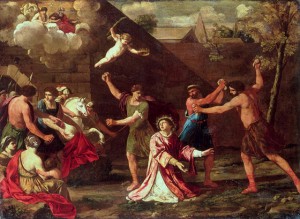In 197 AD, Tertullian wrote: “The blood of martyrs is the seed of the Church.” We usually take this principle for granted. One might wonder, however, if Tertullian would still conclude the same way today. It begins to look more like: “The blood of martyrs ends Christianity.” The systematic destruction of Middle-Eastern Christians along with their buildings is a step 1) to inner Muslim unity, and 2) to a Realpolitik pacification project (religion causes war). Two different “theories” justify the same act. The one involves active persecution; the other involves doing nothing.
Thinking about martyrdom once seemed like a no-brainer. People were killed for refusing to worship false gods. In the early Church, this bloody end was the primary way to recognize sanctity. It was some time before other titles to sanctity were admitted. Martyrdom was the primary test of the truth of the faith.
We see young Coptic men beheaded on the spot for refusing to convert to Islam. We recognize our helplessness. No one is going to “do” anything about it. We hear the pope and Middle-Eastern bishops plea for help, but, they add, help without violence, without war. Qui vult finem, vult media ad finem. You cannot have it both ways. If you command no armies of your own, you depend on those of someone else. They have their own agenda.
Into this mix, something different arises. Throughout history, the concept of martyrdom was relatively clear. Writing of the 17th Century Christian martyrs in Japan, Shusaku Endo, in his novel Silence, described authorities who only wanted to torture Christians so they would apostatize. Killing them gave too much status. Recent Chinese dealings with Christians seem to follow the same policy. Martyrdom was counterproductive. It caused more trouble to its perpetrators than it was worth. Still, it happened.
Formally, the ones who did the killing usually thought that they were carrying out state policy. Martyrdom was not homicide. There were martyrs of virtue, to be sure, women killed for their virtue.
The new reality that we have today is the Muslim who kills anyone who is not Muslim on the grounds that he is guilty for not being Muslim. If a Muslim is killed while killing an infidel, he, not the one killed, is the “martyr.” Such a concept is mind-boggling. The Muslim who is killed while killing is the martyr, not the one whom he kills.

In Shakespeare, we have the murder of a man while he is in the act of committing adultery. This indicates a level of hatred that gives the man killed no chance to repent. In the Muslim concept, the man who kills goes to heaven; the man who is killed does not.
In Chapter 12 of Romans, we read: “Bless your persecutors; bless and do not curse them.” This is, no doubt, a difficult teaching. We are to hate acts of injustice because they are worthy of hatred. When we love the enemy or sinner, we do not love or approve his evil deeds or intentions. What do we do?
Josef Pieper remarked that the Christian martyr does not deny that the world is good even in his martyrdom. Christ and Stephen forgive their enemies. The liturgical celebrations of martyrs are considered occasions for rejoicing. The martyr does not fail in his death to achieve the end for which he was created. Rather he achieves it. Further, the one who kills him has the opportunity to repent, even if he does not do so.
I recall reading about the Canadian Jesuit martyrs. The recent rhetoric about Junipero Serra and Pierre-Jean de Smet (who were not martyrs) is that such missionaries were but exploiters from colonial powers. Some of these French Jesuits made a vow to accept martyrdom. They even prayed for it as part of Ignatius’ third degree of humility. We have to think of them not wanting to damn the Indians, but, at the same time, of accepting martyrdom.
What about the Muslim who thinks that, in killing a Christian, it is he, not the Christian, that is saved? Can we use St. Thomas’ teaching on obedience to an erroneous conscience to excuse him?
“But when the Son of Man comes again, will He find faith on earth.” (Luke, 18:8) Whether the present age is the time of His coming, we know not. What we do know is that, if He comes right now, He won’t find many places in which His teachings are allowed or practiced, when they are allowed.
Isn’t this a pessimistic conclusion? The question is not: Is it pessimistic, but is it accurate? Some “signs of the times” we hesitate to read. In the end, an abundance of martyrs does not suggest that the world is not good. Nor does it suggest that the plan of God for our salvation is not being carried out among us.















